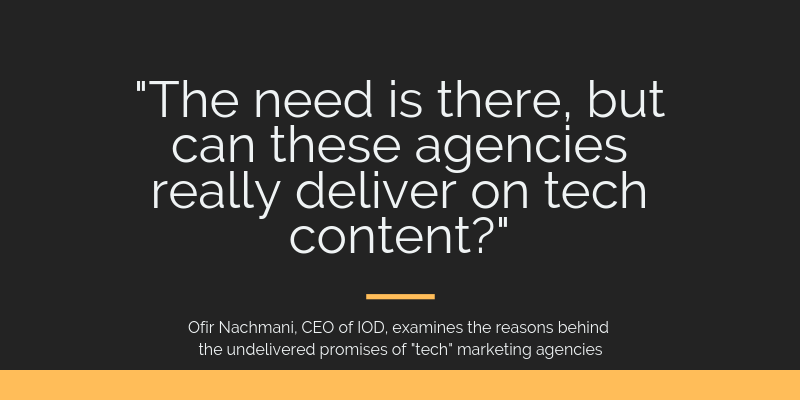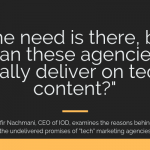In a recent conversation with the VP of marketing and sales at an established big data company, she mentioned the company had conducted a pilot campaign with a leading marketing agency. She noted, “When you take into consideration the $14,000 price tag of the pilot, the campaign resulted in two leads at roughly $7,000 per lead. I’d say that’s pretty poor ROI.”
In another case, the CEO of a successful tech startup requested to meet with me. They had been paying out roughly $150,000 a year to an inbound marketing agency, and weren’t so satisfied with the results.
When I asked their marketing team what their goals had been and what they had achieved working with this agency, they replied, “They’re great guys, but we’ve been disappointed with their content.”
I inquired about their monthly traffic, which they didn’t even know offhand. After some digging, they reported it was a mere 3,000 visitors per month.
These stories highlight a truth for tech brands about where their marketing efforts should be focused on their marketing infrastructure, that is, their content.
Before reaching out to a sales rep, nearly half of all buyers will consume three to five pieces of content. Yet at the same time, 65% of marketers report that they struggle to create engaging content, with a similar number reporting doing so consistently as another challenge (Zazzle Media).

This is one of the reasons “tech marketing” agencies have become so popular. The need is there, but can these agencies really deliver on the tech content?
Based on my many years of experience serving both startups, as well as some of the largest global enterprises, the answer is a resounding no. All too many times, I’ve had new clients approach me in desperation after bad content experiences with an “end-to-end,” do-it-all tech inbound marketing agency. The phrase I hear over and over is, “It was a huge failure, and I heard you can help.”
So where do things go wrong? Why do marketing agencies repeatedly fail when it comes to tech content creation?
Lack of True Tech Expertise
While it might seem obvious that tech expertise would be required at your typical “tech marketing” agency, there usually is not a single tech expert on staff. These agency marketing professionals—including those in charge of content marketing, social media, email marketing, SEO, and PPC—simply lack the tech expertise and certainly don’t understand their clients’ needs as B2B technology vendors.
The agency marketing team’s training on the client’s technology might involve a crash course demo, reading a whitepaper, or skimming the client’s website, but they’re essentially reading about technologies they don’t understand and likely never have and will never use.
In order to acquire the information and background needed to produce the content, the agency’s marketing team must go through the tech company’s in-house marketing team—who themselves usually aren’t tech experts, even if they have experience in marketing technical solutions. And it’s no secret that in-house marketing teams struggle themselves to get the technical info they need from their busy R&D teams, who’d of course rather be coding.
The Challenge of Finding Qualified, Reliable Writers
The next challenge for the agency’s content marketing team is finding a qualified, reliable writer. The content management team reaches out to its network of freelance writers. Yet with zero expertise in the field—and often very limited budgets—finding a suitable writer and determining whether they are truly qualified is virtually impossible. The freelance marketplace is rife with unqualified writers claiming to be tech experts, but the agency’s content team is unable to weed these out.
Availability and reliability of experienced writers is yet another challenge. Wanting their next gig, writers often bite off more than they can chew. Further, dealing with so many clients, they don’t have the time to do the necessary research to learn about your product/services and the tech behind it. Even when they do have the time, too many agencies don’t have the budget to pay the writer for the research required to write a proper piece. This all makes for a very unstable relationship, with zero sense of commitment on either part.
In reality, creating and maintaining a network of reliable and knowledgeable tech marketing writers is a serious investment. It takes a dedicated recruitment team that is both tech and marketing-savvy to find these rare tech experts who are able to write. The latter often require mentoring and guidance. If you had time or resources for mentoring and guidance, you probably wouldn’t be seeking help from the agency!
Limited Scope of Topics–Let’s Create Some Fluff
Because these tech marketing agencies are not using qualified tech experts as part of their content production line, the topics on which they can provide content are limited in scope. Often, they stick to top-of-funnel pieces covering more general, superficial topics—the dreaded listicle, “which is better” articles, or blog posts riddled with boring and pointless statistics—in order to avoid getting deep into the tech. They are simply unable to produce quality, informative, and accurate tech content—especially bottom-of-funnel.
Because they cannot produce the valuable content needed, tech marketing agencies will often resort to repurposing or optimizing old posts. During a meeting with one of our tech brand enterprise clients, the customer recalled a past conversation with a marketing agency consultant. In need of new and original content, the brand had reached out to this particular agency for help. But the agency rep’s reply was, “You just need to take this blog post, add a little design, and repackage it as a whitepaper.”
Instead of finding ways to generate original content, the consultant just went back to his comfort zone. While in and of itself repurposing content can be beneficial, it should not come at the expense of new and original content, and even this practice requires a certain level of expertise in the tech.
All this results in tech brands losing potential customers because the agency they hired to do what they couldn’t do in-house has made false promises about what they can truly provide.
Disrespecting Your Audience
One of the most important strategies in creating good content, according to marketing guru Gary Vaynerchuk, is respecting your audience. Instead of distributing useful tech content to drive attention toward the product/services, marketing agencies often create irrelevant, inaccurate content or repurpose content simply for the sake of clickbait.
Instead of attracting your target audience, this ends up pushing them away and ultimately harms the brand’s reputation. The tech professional you’re trying to target will bounce from your blog and possibly never return. Worse, they might even warn their colleagues on social platforms such as Reddit not to visit your site.
An important marketing practice is to drive bottom-up adoption through the tech professional (the qualifier), who can evaluate the product and lead the decision makers to sign the deal. Your online solution might be geared to engineers, but due to the technical depth required, marketing agencies are generally more comfortable writing fluff and targeting c-levels. Clearly, a data scientist doesn’t need an article on the basics of AI and machine learning, just as a cloud architect doesn’t want to read yet another general cloud migration overview.
As a good rule of thumb, tech brands should be producing eight articles targeting tech professionals for every two articles targeting c-levels. Yet tech marketing agencies are essentially doing the opposite, and the ratio of c-level to tech articles is off. The outcome is low time on site (under three minutes) and high bounce rates (over 70%).
The SEO culture, which drives so many of these marketing agencies, has essentially distorted the concept of what valuable content truly is. In an attempt to remind us, Google has included an entire section on best practices for producing quality content and improving search results in its core updates. You’d think much of this would be obvious, but the overwhelming majority of tech content agencies seemingly fail to meet these basic criteria:
- “Does the content provide insightful analysis or interesting information that is beyond obvious?”
- “Does the content present information in a way that makes you want to trust it, such as clear sourcing, evidence of the expertise involved…?”
- “Is this content written by an expert or enthusiast who demonstrably knows the topic well?”
- “Is this the sort of page you’d want to bookmark, share with a friend, or recommend?”
- “Is the content free from easily-verified factual errors?”
Delayed and Poor Production Process
How many articles has your agency submitted only for them to end up stuck in “review mode”?
A client once told me the agency they used to work with insisted they had a data “expert” to produce their content, but when writing about time series data, the article was so full of inaccuracies, they immediately abandoned it.
Even if the content makes it past the tech brand’s in-house marketing team, these articles often end up getting stuck in tech review. The tech team and CTO know the content is poor but they don’t have the time to devote to rewrites or teaching outsourced agency writers, nor should they be.
Perhaps the content is eventually published, though by then it may be out of date. And worse, it yields poor performance. In all too many cases, though, fixing it is simply not worth the time investment, and the content which the client paid good money for is dropped.
Content As Your Marketing Infrastructure
No matter how “nice” your tech marketing agency may be, no matter how enticing the costs, if they lack the expertise needed to create informative, accurate, and valuable content, they will fail you.
Quality, expert-based content is key for ROI. It is the foundation. Your content should be useful; it should result in engagement and discussion. If not, it will end up working against you and costing you more in the long run. From 2018 to 2019, content marketing budgets increased by 78%, yet tech brands continue to make the mistake of investing money in marketing agencies that are simply not equipped to handle the tech content they claim to be able to deliver on.
I’ve seen it time and time again. So before choosing a tech content marketing agency, ask yourself—and ask them—whether they truly have the tech expertise and in-depth understanding needed to create authentic tech content that will accurately represent your product or service and give you the best return on investment. Check out their work, have your tech team do an in-depth review, and never compromise on your marketing infrastructure.
Maximize your reach with quality, expert-based tech content. Let’s connect one-on-one and we can talk more about it.






